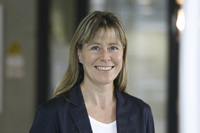17 mars 2016: Prof. Stefanie Dimmeler
Jeudi 17 mars 2016, 12h30
CMU - C150
«Ninety-seven percent of the human genome does not encode proteins; however, much of it is transcribed. Non-coding RNAs are increasingly recognized as critical regulators of tissue homeostasis and disease. Prof. Stefanie Dimmeler, Director of the Institute of Cardiovascular Regeneration at the University of Frankfurt, has dedicated her research to bridge basic discoveries in this exciting new field to clinical translation for ischemic heart disease.»
(Prof. Brenda KWAK, Host - Faculté de médecine UNIGE
Département de pathologie et immunologie & Département de médecine interne des spécialités)
__________________________________________________

Stefanie DIMMELER
Director, Institute of Cardiovascular Regeneration
Centre for Molecular Medicine
Goethe-University, Frankfurt am Main
«Non-Coding RNAs in Cardiovascular Disease»
In recent year, increasing evidence suggests that non-coding RNAs play important roles in the regulation of tissue homeostasis and pathophysiological conditions. Besides small non-coding RNAs (e.g. microRNAs), >200-nucleotide long transcripts, namely long non-coding RNAs (lncRNAs), can interfere with gene expressions and signaling pathways at various stages. MicroRNAs have been shown to control cardiovascular homeostasis and disease and might be interesting targets for therapy. For example, inhibition of miR-92a promotes neovascularization and repair after myocardial infarction in mice and large animal models. Pre-clinical studies currently assess whether antimiRs directed against miR-92a may be used in patients with acute or chronic ischemic heart disease. In contrast to microRNAs, which are more close to clinical translation, the function of lncRNAs is hardly known. LncRNAs comprise a heterogeneous class of regulatory RNAs and we are currently addressing the regulation and function of intergenic lncRNAs (e.g. MALAT1) as wells as circular RNAs, which result from back-splicing, and control endothelial cell functions. The presentation will provide insights into the regulatory RNA network in the cardiovascular system.
Biography
Stefanie Dimmeler is born in 1967 in Ravensburg, Germany. Dr. Dimmeler received her under-graduate, graduate, and Ph.D. degree from the University of Konstanz (Germany). She then completed a fellowship in Experimental Surgery at the University of Cologne and in Molecular Cardiology at the University of Frankfurt (Germany). She is Professor of Experimental Medicine (since 2001) and Director of the Institute of Cardiovascular Regeneration, Center for Molecular Medicine at the University of Frankfurt since 2008.
She is author of more than 300 peer-reviewed papers, published in highly qualified journals. Her global impact factor (IF) is higher than 1000 and her h-index is 115. In the last years, she has been invited as a speaker in more than 300 national and international meetings and seminars and has presented various keynote lectures.
She received several awards including the Award of the German Heart Foundation in 1998, the Frankel-Award of the Ger¬man Cardiac Society in 2000, the Alfred Krupp Award 2002, the Leibniz Award 2005, the Award of the Jung Foundation 2007 and the FEBS award 2006. She presented the prestigious George E. Brown Memorial Lecture at the Scientific Sessions of the AHA in 2005, the Basic Science Lecture of the European Society of Cardiology in 2006. She received the Science4life award, the GlaxoSmithKline Award and the Madrid Award for Stem Cell Therapy in 2014. In 2015 she presented the Thomas W. Smith Memorial Lecture at the Scientific Sessions of the AHA. As well she was among the Thomson Reuters Highly Cited Researcher 2014.
She is editor of “EMBO Molecular Medicine” and associated editor of “Circulation Research” and the “European Heart Journal”.
She is spokesperson of the “Excellence Cluster Cardio-Pulmonary System” (ECCPS), a translational research centre in the field of vascular and parenchymal heart and lung diseases, funded by the DFG, and vice chairperson of two collaborative research networks (SFB834, LOEWE Centre for “Cell- and Gene Therapy”). She received two Advanced Investigator Grants by the European Research Community (ERC).
Her group elucidates the basic mechanisms underlying cardiovascular disease and vessel growth with the aim to develop new cellular and pharmacological therapies for improving the treatment of cardiovascular disease. Ongoing research focuses on epigenetic mechanisms that control cardiovascular repair, specifically the function of histone modifying enzymes and non-coding RNAs.
